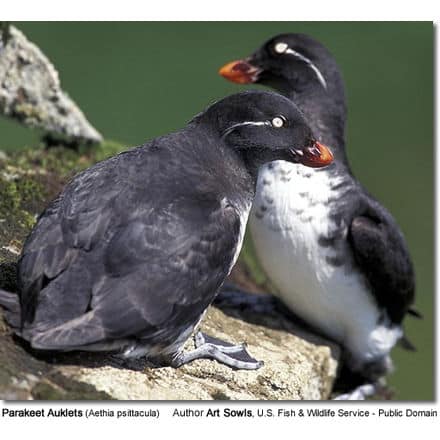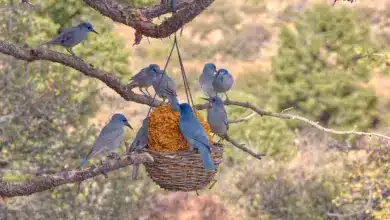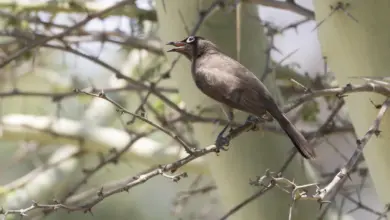Hummingbirds found in Connecticut, USA
Hummingbirds found in the USA (by U.S. State) … Canada … Mexico … Puerto Rico … Jamaica … Honduras
Hummingbird Information … Hummingbird Species Photo Gallery
The following 5 (possibly 6) hummingbird species have been reported in Connecticut (with photos and ID assistance).
Ruby-throated Hummingbirds (Archilochus colubris) – Native – Arrive early May – usually leave in mid-September. Males usually depart first, and females and the young follow about two weeks later.
The male has a ruby-red throat, a white collar, an emerald green back, and a forked tail.
The female has a green back and tail feathers that are banded white, black, and grey-green.

Broad-billed Hummingbirds (Cynanthus latirostris) – Accidental / Vagrants – These mostly Mexican hummingbirds venture into the United States regularly; they mostly visit the southern parts – but a few vagrants travel as far north as Wisconsin. The most likely occurrence would be between July and December near hummingbird bird feeders.
The male is glossy green above and on the chest. He has a deep blue throat. His straight and slender beak is red with a black tip. His slightly forked tail is dark above, and the undertail feathers are white.
The female Broad-billed Hummingbirds are less colorful than the male. Her throat, chest, and belly are light to medium grey. She has a white stripe over each eye.
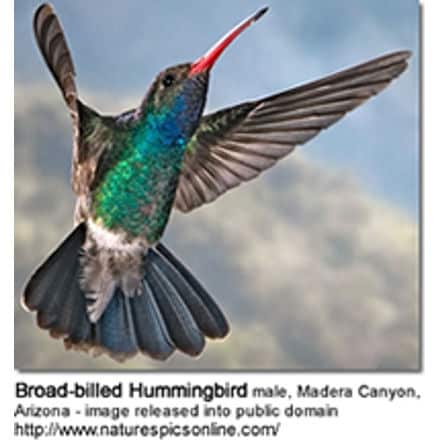
Calliope Hummingbirds (Stellula calliope) – one accepted record, 2006 – Rare / Accidental
The smallest breeding bird in North America. They are most easily confused with the Rufous Hummingbirds and the Broad-tailed Hummingbird.
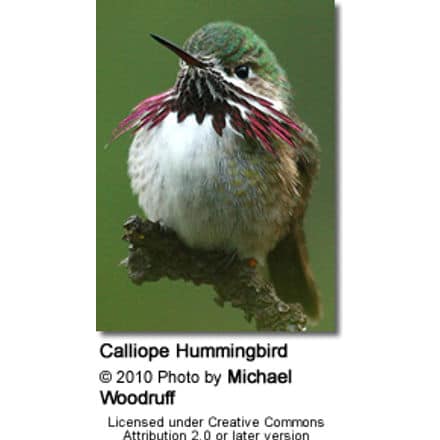
Rufous Hummingbirds (Selasphorus rufus) – Rare / Accidental
These hummingbirds are usually found in gardens and feeders. These birds are fearless and are known for chasing away other hummingbirds and even larger birds, or rodents away from their favorite nectar feeders and flowers.
Males can easily be identified by their glossy orange-red throats.
Females have whitish, speckled throats, green backs and crowns, and rufous, white-tipped tail feathers.
Rufous Hummingbird versus the similar Ruby-throated Hummingbird (Identification)
White-eared Hummingbirds (Basilinna leucotis) – Rare
ID: Both the male and female White-eared Hummingbird have a prominent white ear stripe (more boldly colored in the male) for which this species was named.
If you see a hummingbird that doesn’t appear to be any of the above, please e-mail comments / images to: [email protected]. Thanks!
The favorite feeding plants for Connecticut Hummingbirds are:
Hummingbirds favor red blossoms with a tubular shape. But they also feed on pink, orange, peach, and purple flowers.
- Plumleaf Azalea (Rhododendron prunifolium)
- Crabapple and Sargent crabapple
- Cross Vine (Bignonia capreolata) – evergreen. Orange-red flowers bloom during May and June.
- Corsage – an evergreen (Azalea cultivar) produces lavender blooms
- Wild red columbine (Aquilegia canadensis)
- Cardinal flower (Lobelia cardinalis)
- Trumpet honeysuckle (Lonicera sempervirens)
- Others: Day Lilies, Columbine, Sweet William, Common Foxglove, Hosta, Coral Bells, and Shasta Daisy

